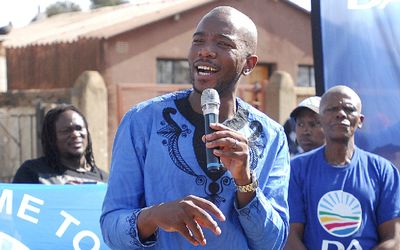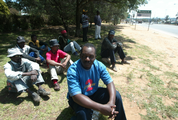ON JUNE 13 Democratic Alliance (DA) leader Mmusi Maimane launched "Vision 2029". The idea sparkled like a diamond — the polished result of the high-gloss marketing the party applies to so much of its rhetoric these days. This was the party’s vision of how SA would look after 10 years of DA governance, in the year 2029. In this imagined utopia milk and honey would flow; in the background, peace and prosperity would reign.
"And believe me, that day is not far off," Maimane assures the party faithful.
But today, 44 days later, we are no clearer as to how exactly the dream will be realised. As ever with the modern-day DA the façade is impressive indeed but on closer inspection the building appears to be façade all the way through — little more than a paper house.
"We will unpack in detail the policies that we will implement to make our vision a reality when we are in national government," Maimane said on June 13. "Policies to get our economy growing and more inclusive. Policies focusing on land reform and BBBEE (broad-based black economic empowerment). Policies that will make our country safer. Policies that will give our children the best possible start in life."
Still we wait.
While we do, at the DA’s convenience, let us consider for a moment what the party is asking of us all.
For one, it is asking us to believe. Not on the basis of a detailed policy platform, carefully costed and considered, but on posters and videos, billboards and pamphlets, promising a better tomorrow. On little more than empty rhetoric. I wonder, would anyone grant the African National Congress (ANC) the same?
Nevertheless, the press has happily and uncritically facilitated this charade. The ANC has many problems with the mainstream media in SA, some more legitimate than others. But it must quite rightly look on with disdain at the media’s unquestioning sympathy for the DA’s entirely unsubstantiated word games. In the wake of the launch, it obliged the DA with a wide spread of exactly the kind of uncritical mass endorsement it was after.
"Picture SA under DA rule," the M&G lovingly reported in a precursor to the launch on June 12. "It is May 2029. The Democratic Alliance has been in power on its own for five years and has just won another national election with a 59% majority. It is 10 years since the formation of a DA-led coalition government after the 2019 general election," the uncritical story reads.
"Maimane launches DA’s vision, promises rapid change", eNCA reported on the day of the launch. "Maimane said his party would provide quality education, an efficient health system and highly trained police officers who'll tackle crime head-on and fight corruption," it reported.
"Democratic Alliance launches Vision 2029 strategy," wrote the Business Day on June 14. "Maimane said the party was preparing to topple the governing ANC in the general elections in 2019 and that in 2029, when the party will be 10 years in government, SA will be safer, have an improved education system and an inclusive economy," went the accompanying blurb.
"Maimane launches DA’s 2029 vision" (ANN7); "DA launches ‘Vision 2029’ campaign" (EWN); "DA predicts it will be in power in 2019" (Times LIVE); "DA predicts it will be in power in 2019" (Sowetan); "What South Africa could look like in 2029" (BusinessTech); "DA reveals its vision for SA" (Sunday Independent). All of these were uncritical descriptions. The DA could have written them itself.
...
WHAT a coup. What a farce.
Without the accompanying policies, Vision 2029 is nothing but an elaborate fraud — pages and pages of rhetoric, but not one single policy in support of it. And the media and public have indulged it all without a second thought.
How the ANC must yearn for a similar response to its own January 8 statement. And those are defined by very particular policies, often painstaking in their lifeless detail, whatever you make of them. In contrast, they are presented to SA in highly critical terms. Analysts are cited in stories and studios critiquing every word. The opposition is quoted in response. Claims are fact-checked in depth. Controversial statements make headlines.
But not the DA. The DA is special. It can promise the world and it will be given no end of uncritical space to set out its dreams in great detail. Not one report anywhere seems to have actually asked: "Hold on, how exactly are you going to do all this?" Google "Vision 2029" for yourself. Marvel at the golden highway laid down for the DA to walk along.
And if you are in any doubt the promises made by the DA aren’t grand indeed, consider these pieces of hyperbole from Maimane’s speech, as he described a glorious future:
"Corruption is at its lowest level ever"; "South Africans feel far safer than ever before"; "The justice system works"; "The barriers of our painful past have been removed".
Those do not set the bar high; it is a standard of living heaven’s gatekeepers aspire to.
"Millions of jobs are being created"; "There are increased child grants"; SA "(will) attain a growth rate of 8%"; "With just 15 Cabinet ministers, the government is lean, clean, efficient and citizen-oriented".
These are massive, substantive undertakings. They require not just profound, all-encompassing and fundamental change to the very edifice itself but a context and a cost. By what measure will South Africans feel safer or corruption be at its lowest point? How many millions of jobs exactly? How will more child grants be funded? What are the barriers to our painful past to which it refers, and how will they be removed? Which national ministries will be scrapped and are the consequences for the very structure of the state at national, provincial and local level?
...
WHO knows? But the DA said it so it must be true and it must be good. Why bother holding the party to the same standard required of the ANC, where every policy proposal is nitpicked down to its bare bones. The ANC is evil, right? The DA is good? That seems to be the implicit assumption. So there is nothing to worry about.
In the Sunday Times, Peter Bruce complained about the DA’s general lack of economic positioning. But why would it position itself in any meaningful detail? It has endless dreams and memes, fantasy and fluff to keep the media well-occupied. That works a charm.
This weekend, after a meeting of the DA’s Federal Council, Maimane announced, "A key part of the intensification of the Vision 2029 campaign will be unpacking our policy offer in coming months. This will start with a comprehensive briefing on our policy on growth and jobs next week."
So perhaps, if we are lucky, one such policy will appear soon. Is a briefing a policy or the prelude to a policy? As for crime, health, education, welfare, justice, housing, governance, for months to come, it seems, we will watch on at the DA’s behest as the game continues to unfold.
Of course, the DA itself would never stand for this kind of blind faith were the ANC to pull a similar stunt. Year after year it derides President Jacob Zuma for his lack of detail or specifics in his state of the nation address. "The president did not put forward any concrete steps to stimulate economic growth, create jobs and uplift poor South Africans," Maimane bemoaned in 2014. "There were no further details on support for small businesses, no answers on the recent downgrading of SA’s credit rating and no answers on the contraction of the economy in the first quarter."
"(This) should have been a debate about ideas," Maimane had the audacity to say. "Unfortunately, the president didn’t bring any today."
But there is one rule for the ANC and another rule for the DA. Maimane is the king of the policy platitude.
The absolute arrogance of the DA, to assume it will be given a free ride on the back of such empty grandiosity. And, simultaneously, the absolute genius of the DA, for understanding that it enjoys a privileged place in the South African media, where it can say and promise whatever it wants without an ounce of critical interrogation; certainly without any demand for details. So disdainful is the DA of the voters it hasn’t even announced a date by which the accompanying policy suite will be made public.
Here is a scarier thought: has it even produced the requisite policies? If it has, where are they? If it hasn’t, on what credible basis can it make such claims in the first place? The lack of any accompanying detail seems to suggest it sat down not with the best and brightest to produce a plan, but with a thesaurus and graphics team to produce the poster for it.
The DA will say it has policies already but in truth, they are irrelevant. The ANC would seem to be right about the party being a policy black hole. It is just talk. Its old policies cannot matter because, if they are the basis for Vision 2029, it is nothing new at all. And that would simply be a fraud of a different kind.
...
TRULY the party has played the country for fools.
"Pay back the money," the saying goes. Here is another one: "Where is the policy?" The ANC should start a countdown clock on a website: "Days since the DA promised a policy programme."
It is typical of the DA under Mmusi Maimane — a party of bright lights and hashtags. But when it comes to the bottom line — the actual ideas and policies that will make or break it in government, the pantry is bare. Not a thing. Just the promise of something to come. Sometime. Somewhere. Somehow. When it suits the DA. In the meantime, please, just "believe".
As SA’s democracy matures it appears to have learnt little. Years of fawning over the ANC under former president Thabo Mbeki, when loyalty to the revolution was a mark of any good patriot, have simply been substituted with a similar, uncritical endorsement of the DA. The truth is, there should be no favourites. All political parties should be subject to the same level of scrutiny.
There is one element of the DA’s Vision 2029 it doesn’t describe, but in light of how its own voters allow it free reins, it might well be worth dwelling on. In 2029 the majority of South African voters will have completely and utterly given up their independence. After years of blindly endorsing the DA, they will have lost the ability to critically assess the party’s performance, lulled into a false sense of security. The DA, unconstrained and unchallenged, will tighten its hold on power and, with time, as ever, power will corrupt. But the public, soporific and dulled, will be too busy believing to notice, until it’s too late.
Part of the DA’s policy should be to create a citizenry that is more critical; one that cares more about policy and its implications. But then it wouldn’t be able to pull the wool over its eyes to its own advantage, would it?
Until the DA releases its policies, it is deserving of not one more uncritical story about its Vision.
No political party, however well intentioned, has the right to make empty promises. The media, the public and civil society, for the sake of accountability and transparency, have a duty to demand more than that. They have all failed badly on this occasion. It is time to bring the DA’s free media ride to an end and to start to demand some hard answers.

Democratic Alliance leader Mmusi Maimane speaks to residents in Jabavu, Soweto. Picture: PUXLEY MAKGATHO
ON JUNE 13 Democratic Alliance (DA) leader Mmusi Maimane launched "Vision 2029". The idea sparkled like a diamond — the polished result of the high-gloss marketing the party applies to so much of its rhetoric these days. This was the party’s vision of how SA would look after 10 years of DA governance, in the year 2029. In this imagined utopia milk and honey would flow; in the background, peace and prosperity would reign.
"And believe me, that day is not far off," Maimane assures the party faithful.
But today, 44 days later, we are no clearer as to how exactly the dream will be realised. As ever with the modern-day DA the façade is impressive indeed but on closer inspection the building appears to be façade all the way through — little more than a paper house.
"We will unpack in detail the policies that we will implement to make our vision a reality when we are in national government," Maimane said on June 13. "Policies to get our economy growing and more inclusive. Policies focusing on land reform and BBBEE (broad-based black economic empowerment). Policies that will make our country safer. Policies that will give our children the best possible start in life."
Still we wait.
While we do, at the DA’s convenience, let us consider for a moment what the party is asking of us all.
For one, it is asking us to believe. Not on the basis of a detailed policy platform, carefully costed and considered, but on posters and videos, billboards and pamphlets, promising a better tomorrow. On little more than empty rhetoric. I wonder, would anyone grant the African National Congress (ANC) the same?
Nevertheless, the press has happily and uncritically facilitated this charade. The ANC has many problems with the mainstream media in SA, some more legitimate than others. But it must quite rightly look on with disdain at the media’s unquestioning sympathy for the DA’s entirely unsubstantiated word games. In the wake of the launch, it obliged the DA with a wide spread of exactly the kind of uncritical mass endorsement it was after.
"Picture SA under DA rule," the M&G lovingly reported in a precursor to the launch on June 12. "It is May 2029. The Democratic Alliance has been in power on its own for five years and has just won another national election with a 59% majority. It is 10 years since the formation of a DA-led coalition government after the 2019 general election," the uncritical story reads.
"Maimane launches DA’s vision, promises rapid change", eNCA reported on the day of the launch. "Maimane said his party would provide quality education, an efficient health system and highly trained police officers who'll tackle crime head-on and fight corruption," it reported.
"Democratic Alliance launches Vision 2029 strategy," wrote the Business Day on June 14. "Maimane said the party was preparing to topple the governing ANC in the general elections in 2019 and that in 2029, when the party will be 10 years in government, SA will be safer, have an improved education system and an inclusive economy," went the accompanying blurb.
"Maimane launches DA’s 2029 vision" (ANN7); "DA launches ‘Vision 2029’ campaign" (EWN); "DA predicts it will be in power in 2019" (Times LIVE); "DA predicts it will be in power in 2019" (Sowetan); "What South Africa could look like in 2029" (BusinessTech); "DA reveals its vision for SA" (Sunday Independent). All of these were uncritical descriptions. The DA could have written them itself.
...
WHAT a coup. What a farce.
Without the accompanying policies, Vision 2029 is nothing but an elaborate fraud — pages and pages of rhetoric, but not one single policy in support of it. And the media and public have indulged it all without a second thought.
How the ANC must yearn for a similar response to its own January 8 statement. And those are defined by very particular policies, often painstaking in their lifeless detail, whatever you make of them. In contrast, they are presented to SA in highly critical terms. Analysts are cited in stories and studios critiquing every word. The opposition is quoted in response. Claims are fact-checked in depth. Controversial statements make headlines.
But not the DA. The DA is special. It can promise the world and it will be given no end of uncritical space to set out its dreams in great detail. Not one report anywhere seems to have actually asked: "Hold on, how exactly are you going to do all this?" Google "Vision 2029" for yourself. Marvel at the golden highway laid down for the DA to walk along.
And if you are in any doubt the promises made by the DA aren’t grand indeed, consider these pieces of hyperbole from Maimane’s speech, as he described a glorious future:
"Corruption is at its lowest level ever"; "South Africans feel far safer than ever before"; "The justice system works"; "The barriers of our painful past have been removed".
Those do not set the bar high; it is a standard of living heaven’s gatekeepers aspire to.
"Millions of jobs are being created"; "There are increased child grants"; SA "(will) attain a growth rate of 8%"; "With just 15 Cabinet ministers, the government is lean, clean, efficient and citizen-oriented".
These are massive, substantive undertakings. They require not just profound, all-encompassing and fundamental change to the very edifice itself but a context and a cost. By what measure will South Africans feel safer or corruption be at its lowest point? How many millions of jobs exactly? How will more child grants be funded? What are the barriers to our painful past to which it refers, and how will they be removed? Which national ministries will be scrapped and are the consequences for the very structure of the state at national, provincial and local level?
...
WHO knows? But the DA said it so it must be true and it must be good. Why bother holding the party to the same standard required of the ANC, where every policy proposal is nitpicked down to its bare bones. The ANC is evil, right? The DA is good? That seems to be the implicit assumption. So there is nothing to worry about.
In the Sunday Times, Peter Bruce complained about the DA’s general lack of economic positioning. But why would it position itself in any meaningful detail? It has endless dreams and memes, fantasy and fluff to keep the media well-occupied. That works a charm.
This weekend, after a meeting of the DA’s Federal Council, Maimane announced, "A key part of the intensification of the Vision 2029 campaign will be unpacking our policy offer in coming months. This will start with a comprehensive briefing on our policy on growth and jobs next week."
So perhaps, if we are lucky, one such policy will appear soon. Is a briefing a policy or the prelude to a policy? As for crime, health, education, welfare, justice, housing, governance, for months to come, it seems, we will watch on at the DA’s behest as the game continues to unfold.
Of course, the DA itself would never stand for this kind of blind faith were the ANC to pull a similar stunt. Year after year it derides President Jacob Zuma for his lack of detail or specifics in his state of the nation address. "The president did not put forward any concrete steps to stimulate economic growth, create jobs and uplift poor South Africans," Maimane bemoaned in 2014. "There were no further details on support for small businesses, no answers on the recent downgrading of SA’s credit rating and no answers on the contraction of the economy in the first quarter."
"(This) should have been a debate about ideas," Maimane had the audacity to say. "Unfortunately, the president didn’t bring any today."
But there is one rule for the ANC and another rule for the DA. Maimane is the king of the policy platitude.
The absolute arrogance of the DA, to assume it will be given a free ride on the back of such empty grandiosity. And, simultaneously, the absolute genius of the DA, for understanding that it enjoys a privileged place in the South African media, where it can say and promise whatever it wants without an ounce of critical interrogation; certainly without any demand for details. So disdainful is the DA of the voters it hasn’t even announced a date by which the accompanying policy suite will be made public.
Here is a scarier thought: has it even produced the requisite policies? If it has, where are they? If it hasn’t, on what credible basis can it make such claims in the first place? The lack of any accompanying detail seems to suggest it sat down not with the best and brightest to produce a plan, but with a thesaurus and graphics team to produce the poster for it.
The DA will say it has policies already but in truth, they are irrelevant. The ANC would seem to be right about the party being a policy black hole. It is just talk. Its old policies cannot matter because, if they are the basis for Vision 2029, it is nothing new at all. And that would simply be a fraud of a different kind.
...
TRULY the party has played the country for fools.
"Pay back the money," the saying goes. Here is another one: "Where is the policy?" The ANC should start a countdown clock on a website: "Days since the DA promised a policy programme."
It is typical of the DA under Mmusi Maimane — a party of bright lights and hashtags. But when it comes to the bottom line — the actual ideas and policies that will make or break it in government, the pantry is bare. Not a thing. Just the promise of something to come. Sometime. Somewhere. Somehow. When it suits the DA. In the meantime, please, just "believe".
As SA’s democracy matures it appears to have learnt little. Years of fawning over the ANC under former president Thabo Mbeki, when loyalty to the revolution was a mark of any good patriot, have simply been substituted with a similar, uncritical endorsement of the DA. The truth is, there should be no favourites. All political parties should be subject to the same level of scrutiny.
There is one element of the DA’s Vision 2029 it doesn’t describe, but in light of how its own voters allow it free reins, it might well be worth dwelling on. In 2029 the majority of South African voters will have completely and utterly given up their independence. After years of blindly endorsing the DA, they will have lost the ability to critically assess the party’s performance, lulled into a false sense of security. The DA, unconstrained and unchallenged, will tighten its hold on power and, with time, as ever, power will corrupt. But the public, soporific and dulled, will be too busy believing to notice, until it’s too late.
Part of the DA’s policy should be to create a citizenry that is more critical; one that cares more about policy and its implications. But then it wouldn’t be able to pull the wool over its eyes to its own advantage, would it?
Until the DA releases its policies, it is deserving of not one more uncritical story about its Vision.
No political party, however well intentioned, has the right to make empty promises. The media, the public and civil society, for the sake of accountability and transparency, have a duty to demand more than that. They have all failed badly on this occasion. It is time to bring the DA’s free media ride to an end and to start to demand some hard answers.



















Post a comment